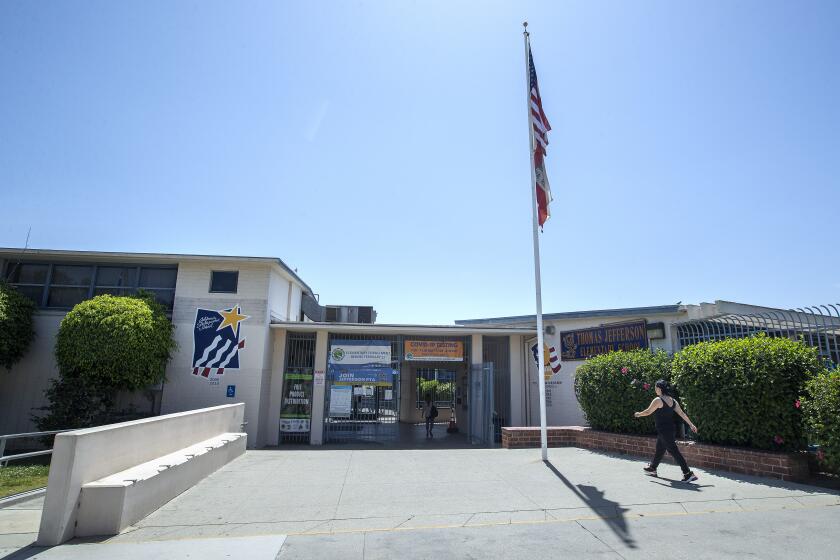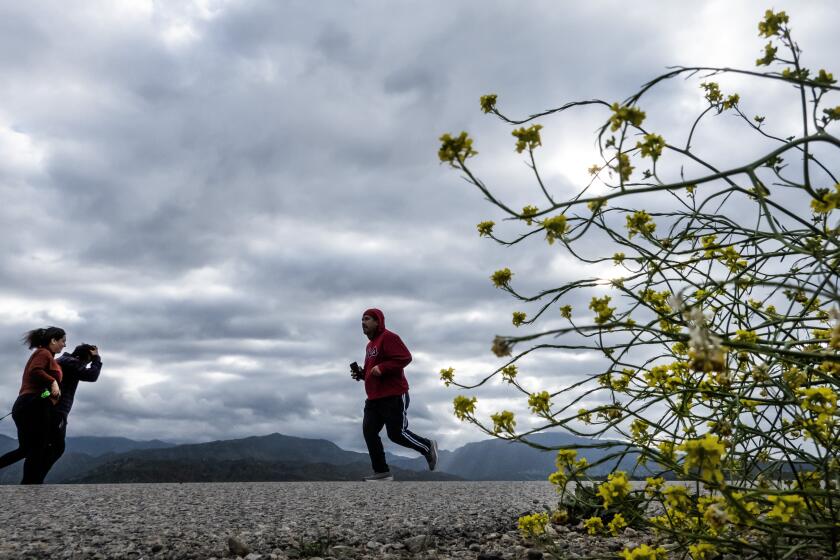A River Rises to Reclaim Its Past
A series of short siren blasts signaled a climactic moment in a decades-long battle over the Trinity River, which, like so many rivers in California, has lost much of its water, its fish and its freedom.
As a gate lifted on the small concrete Lewiston Dam, about an hour’s winding drive west of Redding, water spilled down an apron into the Trinity. Federal dam managers, who have spent the last 40 years sucking water from the river and sending most of its flow to the farm fields of the Central Valley, were letting the Trinity go.
The river ran frothy and aqua-green, knocking down willow trees along its banks, muscling over its sandy shoulders and roaring under bridges. It was fast. It was rambunctious. For four days, it was its old self.
The water release, which tapered over the weekend, is key to one of the most ambitious river restoration efforts in the West, intended to revive the Trinity’s long-suffering salmon and steelhead runs.
The U.S. Bureau of Reclamation, the West’s preeminent dam master, has increased flows on other rivers to protect endangered fish. But the agency says that it has never given back so much water to a single river for environmental restoration anywhere in the country.
“This is exciting. A lot of people have been working for this for a long time,” Rod Wittler, senior scientist with the Trinity River Restoration Program, said as he watched the dam gate inch open. “I think of all the rivers in California, the plan for restoring this one can work. There’s a real chance of success here.”
The restoration, ordered by then-Interior Secretary Bruce Babbitt in 2000 but stalled by lawsuits until this year, allows about half the Trinity’s volume to stay in the 130-mile-long river, which cuts through the Trinity Alps before veering west and joining the Klamath River on its way to the Pacific.
Up until now, 75% of the Trinity’s water -- and at times as much as 90% -- has been piped through a mountain tunnel to the Sacramento River, which carries it south to the Delta and a federal aqueduct that feeds the Central Valley.
Babbitt’s was the most sweeping order of several issued in the last 25 years to maintain flows for the river’s steelhead, chinook and coho salmon populations, which have plunged to roughly one-fifth of what they were before the Trinity and Lewiston dams were completed in 1963, capturing the river’s frigid headwaters.
“It was nothing to catch 100 fish if you left your net in. Today you’re lucky if you catch 10,” said LeRoy Jackson, a council member of the Hoopa Valley Indian Tribe, one of the driving forces behind the river’s restoration.
The dams stopped spring flooding that scoured sand from the river’s bottom, washed young trees and bushes out of the channel, and kept the water cold. The riverbed grew narrower, its edges choked with growth. Fish spawning beds were buried in sand; the shallow back pools in which juvenile salmon could rest and feed disappeared. Trapped behind the dams, gravel was no longer washed downriver to replenish spawning beds.
By letting the Trinity keep more of its water, and releasing it in ways that mimic nature’s cycle of high spring flows, scientists hope to restore conditions that will help the fish spawn and grow healthy and plump for their journey downriver to the sea.
“We’re basing it on the premise that if we build the habitat, the fish will find it,” said Nina Hemphill, a restoration program fisheries biologist.
It was with a bit of glee that her colleague Wittler watched a tall tree sway as the rising river threatened to topple it. “The whole idea is to start getting these guys out of here,” he said.
Using heavy equipment, restoration workers are also going to clear vegetation from 16 miles of the river channel to give the Trinity more room to roam and create fish-friendly shallow pools.
The program is spending $6 million in federal funds building higher bridges to replace a series of small private spans that would be washed out with the higher flows. The new bridges will be turned over to the private landowners who maintained the old ones.
The Bureau of Reclamation has bought a house downriver from Lewiston that sits in the Trinity’s path and will probably help move some others.
“I hope they accomplish what they’re trying to accomplish,” said the house’s owner, Donald Tullis, who is moving into town. On his porch, friends stood sipping beer as the swelling river lapped at the foundations and made an island of a birdbath on Tullis’ submerged lawn.
For the most part, people in this sparsely populated, richly wooded stretch of Northern California are happy about the dam releases, said Howard Freeman, chairman of the Trinity County Board of Supervisors. “It’s been no secret we need water in the river to keep it healthy. That’s been the mantra for the last 30 years.”
Freeman, his head shaved and three rings dangling from his ears, recalled a local high school conservation teacher who bemoaned the Trinity’s dammed state back in the 1970s. High school students held protests as the band played funeral marches for the river.
So few steelhead and coho returned to spawn that “we thought about giving them names,” remembered Jim Smith, an 80-year-old former county supervisor who fished the Trinity as a youth.
A local congressman campaigned for restoration money, and in 1981, the secretary of the Interior ordered Reclamation to nearly triple the Trinity’s flows in all but dry years. He also ordered a study on the amount of water needed for the river to rebound. Another 18 years passed before the report was completed, during which time Congress and another Interior secretary mandated that the higher flows be maintained.
Based on the study, Babbitt signed a decision five years ago ordering still higher flows, as well as a broad restoration effort. Under the decision, the amount of water released into the river will vary according to how wet or dry the year is. But on average, water exports from the Trinity will drop 28%, reducing reclamation’s total water deliveries to the Central Valley by 1% to 4%.
Northern California hydropower producers and Central Valley irrigators sued to block Babbitt’s order. Last November, a federal appeals court upheld the restoration plan, clearing the way for the program’s launch.
A couple hours’ drive downriver from Lewiston, on the Hoopa reservation, tribal leaders aren’t yet ready to claim victory. The Interior Department should be spending more, they say, to clear vegetation and restore the river channel to its pre-dam condition.
The Hupa people have lived on the banks of the Trinity for thousands of years. When the salmon all but disappeared, so did a main staple of the Hoopa tribe’s diet and a cornerstone of tribal culture.
“It’s not about a few more fish,” said tribal Chairman Clifford Lyle Marshal.
“It’s about a quality of life, a way of life.”
More to Read
Start your day right
Sign up for Essential California for news, features and recommendations from the L.A. Times and beyond in your inbox six days a week.
You may occasionally receive promotional content from the Los Angeles Times.







